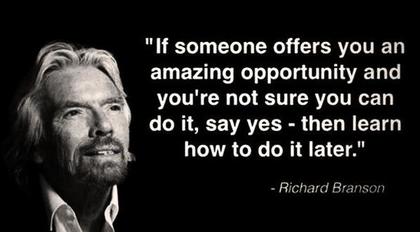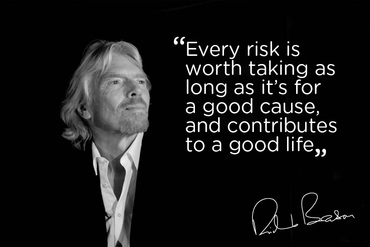|
Sir Richard Branson has turned 65 and is doing 65 challenges people pose for him this year. So far, they're really quite interesting but I want him to aim higher. This isn't because I think he can't do it, but because I'm certain he can. I want to challenge Richard to take on one of the world's most pressing problems. It is one that is close to his heart and indeed close to the hearts of many millions of people around the world, including my own. I #ChallengeRichard to transform schools and finally fix education once and for all. Look, I'm even going to make it easy for him. What I'm offering here is a vision of what he should aim for. But before I get to that, I feel I need to explain how I came to this rather odd way to spend a Friday evening (Richard, I know you're busy, so feel free to skip below). My aversion to capitalism notwithstanding, I have always really admired Sir Richard Branson. This is a guy who knows no limits and makes big dreams materialize. He lives one of the best lives ever lived and does it by adding massive value to the world. I expect I'll get to see earth from space one day thanks to him. He's even taking on climate change. The world needs more people like Sir Richard. He's on my mind because I've been really frustrated with teaching lately. Yes, I am still excited to go to work every day and truly love what I do. It's my purpose and passion in life. But schools are very clearly anachronistic in design and simply lack ambition in their goals. As learning environments, they are sub-optimal at best and lead teachers and students to live burnt-out lives. I think every teacher who sees their work as their calling and not just a job knows deep down that we can do so much better. But we are so heavily constrained in so many ways that the whole system needs to be re-thought. Enter Sir Richard. I was on Twitter last night and read a post of his entitled, Learning on the Go. It's a breezy but fascinating read. He explains how he got his start in magazine publishing and just went from there. His thesis is that "If you don't know how to do something, say yes, and learn to do it later." That's what he did. He had the courage to break down closed doors, walk through those that opened for him, and then fail forward towards success. I ended up reading a bunch of his blog posts and really got to thinking. What if I had his courage? What would I make my life about? It's funny how sometimes asking the right question makes things become so clear. When I was in high school I resolved to fix education worldwide. Like Richard, I used to be a big dreamer, too. It turns out we had even more in common than that. Both of us loved learning but hated high school. However, our mutual repugnance led us on very different paths. I worked my butt off getting three degrees and went into teaching. He became Sir Richard Branson. I gave up on my big dreams to settle for smaller (but still extremely important) ones. He followed his. I really respect that. So, to answer my question, that's what I'd do: I'd fix education, or more specifically, schools, worldwide. I know we have the passion and expertise to do this. But here's the problem. The barriers are too high and the incentives are all wrong. Schools will never be improved from within the system of schooling. Those who administer it gained their positions by playing by the rules of the game and have all the reason in the world to maintain the status quo. Independent schools have more freedom and thus more potential. A visionary educator can create a better model of schooling, such as the United World College schools. However, even the best schools out there are incentivized to aim lower than they should. The reality is that schools serve parents first and students second. Parents quite rationally seek the best for their kids by putting them on a track to university or in a vocational school to get a job in the labour market. They make safe bets by putting them in the best school they can gain access to, but this means that the goals for schools are really rather conservative. Kids will always go through less than stellar schools so long as schools remain dedicated to these unambitious goals. We need to aim much higher. What we need are "Big Hairy Audacious Goals." Our goals should be no less than helping each and every kid find what Sir Ken calls, "the Element," where one's talents and passions converge. On top of that, we should aim to equip each kid with their own unique blend of the cognitive, social, emotional, and practical skills they need to add real value to the world. University or manual jobs may be great routes for many, but neither should be a universal goal. The point is there can't and should not be any universal goals. Our job is to help kids find their own personalized paths, figure out what skills they need, and give them opportunities to develop them both in school and by taking action in the world. We need to do so in a way that affirms the central importance of cultivating emotional well-being while pushing kids outside of their comfort zones in the right ways and at the right times for each kid. We need to nurture creativity, critical thinking, compassion, experimentation, and the development of character traits like grit and perseverance that support success. Above all, we need to encourage our kids to dream bigger than we do, to go out there and try to fix the world we've all played a part in breaking. We need to give them the freedom and support to follow their passions, to fail, and then get back out there and try again. Kids will amaze you when you set your expectations high but let them choose their own path. Mine certainly do. Most schools and all school systems, however, simply cannot aim this high because it's too risky. The only solution is to start a new system of schools. We need to start with one school, get things right, and grow from there. As we show the world what kids are really made of, we will slowly discredit the hegemonic model and systems will start to transform. But here's the thing. We need to show that we can provide an outstanding educational experience for any and all students. No one in power will take us seriously if we only serve the most advantaged students. People will rightly say that all we've done is create another elite school and that the model simply isn't replicable. The implication of this is that the schools of the future cannot begin as start-ups. The costs are simply too high and tuition is a barrier. So this really begs the question: Who can achieve all this? We need someone with a big bank account and an even bigger heart. We need a benefactor who is unafraid to cause transformative disruptions and take on the world and win. We need someone who knows how to mentor leaders and grow institutions. We need a person who knows how to get the world's attention, attract the best talent, and convince parents to take a calculated risk in putting their kids in our hands. And crucially, we need someone who knows as well as teachers do that schools are prisons for some of our most talented kids and a big bore for most. The only person I can think of who meets all of these criteria is, yes, Richard Branson. So, Richard, the challenge put precisely is this: I challenge you to start the best school the world has ever seen and to do it relatively cheaply. Then replicate it over and over. Finally, usurp the dominant model that I know you secretly still distrust, perhaps even despise. And in so doing, change the world.
Yes, I know that this is not something that can be done in a year as one of your 65 challenges. It will take a while (maybe a decade) to fully formulate, implement, and refine. But really, there's nothing stopping you from starting now. I'll even give you a head start by outlining some basic principles.
So, Sir Richard, there you go. I could go on and on, but I've given you a bit of a head start and can fill in the details later if you like. I hope this doesn't all sound naive or wishy-washy. It isn't. There are schools out there that are already doing much of what I've described. But they tend to be highly specialized, lack the ability to aim past the traditional goals of schooling, or are the kind of place Prince Charles would go to school. I don't at all mean to disparage these schools. They are absolutely doing the world a wonderful service and I haven't the slightest doubt that their teachers are bending over backwards to serve their students and parents. But no one has yet threaded all the best elements of schooling together. We need a new synthesis. It's time someone did that, and I know you can. So that's my challenge to you. Gather together an amazing group of educators truly committed to transforming education and start putting the pieces together. Build schools that put the learner first and let kids build us all a better world. Comments are closed.
|
Archives
October 2016
Categories |


 RSS Feed
RSS Feed
